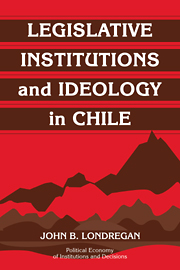Book contents
- Frontmatter
- Contents
- Acknowledgments
- Introduction
- 1 Ideology and Valence
- 2 Accident and Force
- 3 Legislative Institutions in the Constitution of 1980
- 4 Roll-Call Votes and Senate Committees
- 5 The Labor Committee
- 6 The Education Committee
- 7 The Constitution Committee
- 8 Legislative Politics and Chile's Transition Toward Democracy
- Conclusion
- A Estimating Preferences from Voting Records
- Bibliography
- Index
- Titles in the series
6 - The Education Committee
Published online by Cambridge University Press: 22 October 2009
- Frontmatter
- Contents
- Acknowledgments
- Introduction
- 1 Ideology and Valence
- 2 Accident and Force
- 3 Legislative Institutions in the Constitution of 1980
- 4 Roll-Call Votes and Senate Committees
- 5 The Labor Committee
- 6 The Education Committee
- 7 The Constitution Committee
- 8 Legislative Politics and Chile's Transition Toward Democracy
- Conclusion
- A Estimating Preferences from Voting Records
- Bibliography
- Index
- Titles in the series
Summary
The Education Committee deals with an issue area emphasized in the political campaigns of both the Concertación and its opponents. The disagreements about education are not simply about the level of spending, but about the most desirable type of spending. From the left, teachers' unions exert significant influence. Banned and harassed during the Pinochet years, the major teachers' union has emerged since 1990 as one of the most important in Chile, staging various national strikes. From the right there is pressure to provide more funds to subsidized private schools, and to allow them more flexibility.
Labor relations issues constitute a significant part of the committee's agenda. This happens because in Chile public education is administered by the national government. Thus, details about working conditions and compensation that in many other places are resolved by school boards and local unions are worked out at the national-level in Chile. Moreover, the teachers' union is probably the most powerful national-level union in Chile. In contrast with the labor committee, on which the policy agenda mostly applies to settings in which the government acts as a referee, in education policy the government constitutes the employer half of a bargaining dyad.
A second important part of the committee's policy agenda deals with public subsidies for students in private schools. During the Pinochet years the educational system was the subject of a major and controversial reform.
- Type
- Chapter
- Information
- Legislative Institutions and Ideology in Chile , pp. 146 - 171Publisher: Cambridge University PressPrint publication year: 2000

